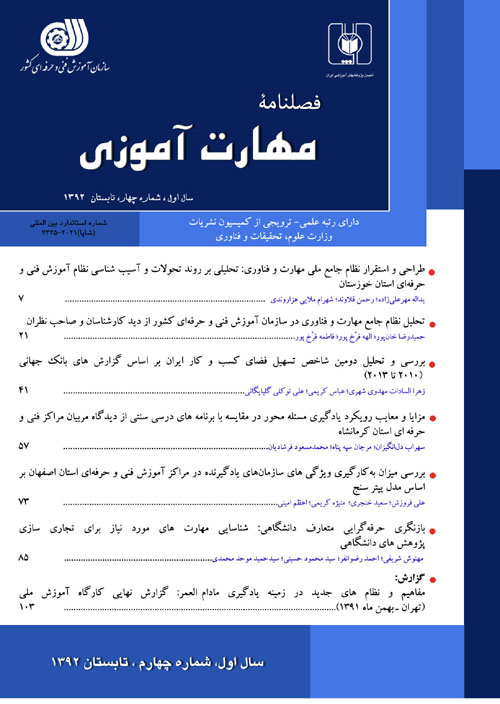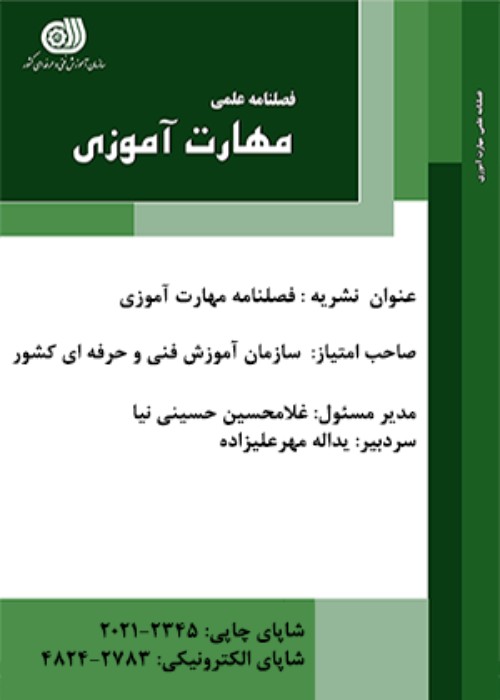فهرست مطالب

فصلنامه مهارت آموزی
پیاپی 4 (تابستان 1392)
- تاریخ انتشار: 1392/06/18
- تعداد عناوین: 7
-
-
صفحه 7
پژوهش حاضر با هدف بررسی روند تحولات آموزشهای فنی و حرفهای در استان خوزستان و شناسایی فرصتها، تهدیدها، قوتها و ضعفهای نظام آموزش در اداره کل آموزش فنی و حرفهای استان خوزستان با استفاده از روش SWOT انجام شده است. اطلاعات مورد نظر بر اساس بررسی و تحلیل منابع و اسناد ملی و استانی، گزارشهای اداره کل آموزش فنی و حرفهای استان خوزستان و مطالعات گذشته گردآوری شده است. در پایان نیز راهکارهایی برای نظارت و ارزیابی نظام جامع مهارت و فناوری ارایه شده است.
کلیدواژگان: آموزش فنی و حرفهای، نظام جامع مهارت و فناوری، سازمان آموزش فنی و حرفهای استان خوزستان -
صفحه 21
پژوهش کیفی حاضر با هدف تحلیل نظام جامع مهارت و فناوری در سازمان آموزش فنی و حرفهای کشور انجام شده است. یافتههای این پژوهش در چهار طبقه مهم شامل 1) چگونگی تامین نیازهای نیروی انسانی بازار کار، 2) انعطافپذیری و پویایی، 3) بهروز بودن محتوا و شیوههای آموزش و 4) چگونگی فراهمسازی زمینه آموزش مادامالعمر ارایه شده است. این پژوهش راهکارهای مهمی را در راستای اجرای موفقیتآمیز نظام جامع مهارت و فناوری مطرح نموده است.
کلیدواژگان: نظام جامع مهارت و فناوری، آموزش فنی و حرفه ای، صاحب نظران -
صفحه 41
بهطورکلی، عوامل بسیاری بر موفقیت کسب و کارهای کوچک و متوسط و در نهایت توسعه اقتصادی موثرند که در این میان نقش فضای کسب و کار و تسهیل این فضا برای کارآفرینان نوپا و صاحبان کسب و کار غیرقابل انکار است. در این مقاله با مرور گزارشهای بانک جهانی در طی چهار سال 1388، 1389، 1390 و 1391 و ادبیات موجود مربوطه شده است به تحلیل وضعیت ایران در دومین شاخص تسهیل فضای کسب وکار با عنوان «دریافت مجوزهای ساخت وساز» بپردخته شود. این مقاله از نوع مروری و از نظر هدف کاربردی است. از روش کتابخانهای- اسنادی بهویژه گزارشهای بانک جهانی در طی سالهای 2010 تا 2013 برای گردآوری اطلاعات استفاده شده است. نتایج تحلیل نشان میدهد که وضعیت ایران در بین 185 کشور مورد ارزیابی در زمینه شاخص دوم، وضعیت مناسبی نبوده و با توجه به عملکرد صعودی برخی کشورها، جایگاه ایران روند نزولی داشته است که این امر به دلیل روند طولانی و زمان بر فرایند اخذ مجوز ساخت و ساز در ایران بوده و در انتها بر اساس نتایج حاصل از تحلیل، پیشنهادات کاربردی برای سیاستگذاران حوزه مربوطه ارایه شده است.
کلیدواژگان: تسهیل فضای کسب وکار، مجوزهای ساخت وساز، بانک جهانی، راه اندازی کسب و کار -
صفحه 57
هدف از این پژوهش، بررسی دیدگاه های 87 نفر از مربیان مراکز فنی و حرفه ای استان کرمانشاه در راستای طرح اجرا شده دوره های مهارتی مهندسان فردا مبتنی بر رویکرد یادگیری مسیله محور در مقایسه با برنامه های درسی سنتی است. برای جمعآوری اطلاعات از پرسشنامه محققساخته استفاده شده است. نتایج نشان داد که موفقیت دوره های مهارتی مهندسان فردا با رویکرد یادگیری مسیلهمحور در مقایسه با برنامههای درسی سنتی، به عوامل مهمی چون تناسب زمان با طول دوره، امکانات و تجهیزات آموزشی و تمایل فراگیران به شرکت در کلاس ها بستگی دارد. علاوه بر این مربیان بالارفتن میزان خلاقیت دانشآموزان، شکوفا شدن استعدادهای پنهان و علاقمندی به دروس عملی و تیوری را به عنوان مزایا و فقدان امکانات کمک آموزشی متناسب با رشته ارایه شده، فقدان تجهیزات آموزشی، عدم برنامه ریزی مناسب و عدم تفکیک سنی دانشآموزان را بهعنوان معایب این طرح معرفی کردهاند.
کلیدواژگان: یادگیری مسئله محور، مهندسان فردا، آموزش فنی و حرفه ای، برنامه های درسی سنتی -
صفحه 73
ضرورت پیادهسازی ویژگیهای سازمان یادگیرنده در مراکز آموزش فنی و حرفهای، از لحاظ برخورداری از شبکهای گسترده و ارایه فعالیتهای آموزشی در محیط پیچیده و متغیر اجتماعی، فنی، تکنولوژیکی بهمنظور رقابت با سایر موسسات آموزشی انکارناپذیر است. بر این اساس پژوهش پیمایشی حاضر بهمنظور بررسی میزان بهکارگیری این ابعاد بر اساس مدل پیتر سنج در مراکز آموزش فنی و حرفهای استان اصفهان انجام شده است. نتایج نشان میدهد که کلیه شاخصهای یادگیری سازمانی مدلسنج در حد پایینتر از متوسط قرار دارند و با توجه به اهمیت بالا و یکسان هر یک از آنها در میزان یادگیری، لازم است اداره کل آموزش فنی و حرفهای استان اصفهان به تقویت ویژگیهای سازمان یادگیرنده در زمینه کلیه شاخصهای یادگیری بپردازد. از سوی دیگر، با توجه به رتبهبندی شاخصهای مذکور توجه به شاخصهای «یادگیری جمعی» و «آرمان مشترک» نسبت به «مدلهای ذهنی»، «قابلیتهای شخصی» و «تفکر سیستمی» در اولویت بالاتری قرار دارند.
کلیدواژگان: یادگیری سازمانی، سازمان یادگیرنده، مدل پیتر سنج -
صفحه 85
با وجود اهمیت نقش تحقیق و توسعه، تا کنون بهطور نسبی کمتر در نظام مدیریت تحقیقات کشور به "رسانش، کاربرد نتایج و بهره برداری از یافته های پژوهشی" توجه شده است. در چنین شرایطی، بر عهده تمامی موسسات پژوهشی و دانشگاههای کشور است تا به تجاریسازی یافته های پژوهشی خویش جهت تحقق اقتصاد دانشبنیان و رسیدن به آرمانها و اهداف توسعه پایدار کشور اهتمام ورزند. در این مقاله، تلاش شده است تا از منظر توسعه حرفهای و در قالب یک پژوهش کیفی، مهارتهای مورد نیاز اعضای هیات علمی کشاورزی برای تجاریسازی تحقیقات دانشگاهی و راهکارهای توسعه قابلیتهای حرفهای اعضای هیات علمی در این خصوص شناسایی و معرفی شود.
کلیدواژگان: تحقیقات دانشگاهی، تجاری سازی یافته های پژوهشی، توسعه حرفه ای - گزارش
-
Page 7
The purpose of this research is to investigate the trend of changes of technical and vocational training in Khuzestan province. Moreover, the opportunities, threats, strengths and weaknesses of the technical and vocational training system have been also investigated using SWOT method. The data are based on the investigation and analysis of the resources and documents at national and provincial level, reports of technical and vocational training organization of Khouzestan province and previous studies. Finally implications have been introduced for monitoring and evaluating of comprehensive system of skill and technology in Khuzestan province.
Keywords: Technical, Vocational Training, Comprehensive System of Skill, Technology, Vocational Training Organization of Khuzestan -
Page 21
This qualitative study aims to analyze national comprehensive system of skill and technology in point of view of experts and scholars. The results of study are explored in 4 important categories including: 1) requirements of the labor market, 2) flexibility and dynamism, 3) being up to date of content and training methods, and 4) how to provide lifelong education basis. This study has implication for proper implementation of national comprehensive system of skill and technology.
Keywords: National Comprehensive System of skill, technology, Vocational, Technical Training, Experts -
Page 41
Generally many factors have an effect on the success of small and medium-sized enterprises and finally economic development. In this situation the role of business environment and the facilitation of business trades for start-up entrepreneurs and business owners are unavoidable. This paper attempts to do a review of the World Bank’s Business trades Reports in 2010, 2011, 2012, and 2013, as well as the related literature, and also tries to study and analyze the Islamic Republic of Iran’s ranking in the second index of business trades: “Dealing with construction permits”. The research has employed a review and applied method. The reliable and valid data of World Bank reports, in 2010- 2013 were used. The results show that Iran’s ranking in the second index of facilitation of business trades among the 185 economies is not placed in an appropriate level. Increase in number of procedures and days to get construction permits during the 4 years of analysis can be considered among the reasons for low rank of Iran. Overall, we have proposed some recommendations for policy makers in this field based on the results of analysis.
Keywords: Facilitating of Doing Business, Construction Permits, World Bank, Business Start-up -
Page 57
The purpose of this study was to investigate the advantages and disadvantages of problem-based learning approach in enhancing tomorrow's engineers' skills as compared to the traditional curriculums from the viewpoint of 87 vocational trainers working in the technical and vocational centers in Kermanshah. The data collecting tool was a researcher-made questionnaire. The results show that the appropriateness of the engineers’ training is highly related to the appropriate time period, educational facilities and the willingness of learners to participate in problem-based learning approach as compared to traditional curriculums. Moreover, results list the advantages of the problem-based approach as improving level of student creativity, recognizing the hidden and undiscovered talents, developing interest in practical and theoretical lessons. Furthermore, the disadvantages include: Lack of proper educational facilities, lack of proper planning and lack of students’ age-segregation.
Keywords: Problem-Based Learning, Tomorrow's Engineers, Technical, Vocational Training, Traditional Curriculums -
Page 73
The implementation of learning organization characteristics in technical and vocational training centers is essential due to their extensive network and training activities in a complex and changing social, technical, and technological environment. The present survey study is implemented with the aim of investigating the application of learning organizations characteristics in technical and vocational training centers of Isfahan based on Peter Senge model. Results are indicating that all characteristics are lower than average. Regarding to their equal importance in learning, technical and vocational training organization of Isfahan should pay more attention to enriching all characteristics. Furthermore, regarding the ranking of characteristics, it seems that "collective learning" and "building shared vision" are more important than "mental models", "mastery" and "systematic thinking".
Keywords: Organizational Learning, Learning Organization, Peter Senge Model -
Page 85
Despite the importance of research and development, yet relatively little research have been noted and considered with regard to the management and application of the research findings. In such circumstances, research institutes and universities all over the country are bound to move toward the commercialization of their research findings in line with knowledge-based economy and in order to achieve national sustainable development goals. From the perspective of professional development, this qualitative research was done with the aim of identifying the professional skills and required skills of agriculture faculty members for university research commercialization and suggests appropriate procedures to enhance the required professional capabilities.
Keywords: University Research, Research Commercialization, Professional Development


